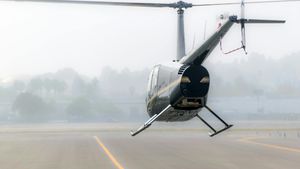Sri Lanka is witnessing significant economic changes as the country emerged from its worst economic crisis, highlighted by the recent report of consumer prices falling by 4.0% in January 2025. This decline marks the highest deflation rate since July 1960, signaling positive signs for consumers and the larger economy.
Officials attributed this drop to substantial reductions in electricity and fuel costs, helping the South Asian nation recover from the turmoil of rampant inflation, which peaked at 69.8% back in September 2022. The crisis led to severe shortages of consumer goods, but with the implementation of measures laid out by the International Monetary Fund (IMF), including higher taxes and cuts to state spending, the country is slowly stabilizing.
According to recent statistics from the Colombo Consumer Price Index, January represented the fifth consecutive month of reported deflation. The central bank has forecasted annual inflation to fall to around 5.0% by 2025. The IMF's $2.9 billion bailout loan, secured post-crisis, is instrumental for this economic turnaround.
Alongside these economic indicators, President Anura Kumara Dissanayake is proposing initiatives aimed at fostering national solidarity. During a speech made in Jaffna, he announced plans to establish a national festival bringing together all of Sri Lanka’s diverse communities, including Tamil, Sinhala, Muslim, Buddhist, Hindu, Catholic, and Islamic groups. This festival, scheduled for October, aims to unify the nation and celebrate the country's rich cultural heritage.
Reflecting on the need for unity, the President posed the rhetorical question, "We always have functions different from each other. Don’t we need one day to celebrate together?" highlighting the importance of collective identity amid historical divisions.
President Dissanayake envisions the festival showcasing shared culture through various forms like food, music, and arts. He added, “Even though our generations fought wars, we will not allow our children’s generations to wage wars,” emphasizing his administration’s commitment to ensuring future generations experience harmony.
The proposed national festival aligns with broader goals of reconciliation, particularly significant for citizens who have been affected by the ethnic conflicts of the past. By leveraging cultural expressions to bridge gaps, the festival aims to instill newfound hope and unity among the people of Sri Lanka.
While economic recovery is on the right path, officials urge caution. They remain vigilant about the structural adjustments and challenges associated with adhering to IMF agreements, which could impact public sentiment and expectations.
General consensus among economists is cautiously optimistic. Significant economic hurdles remain, but the reduction of deflation provides concrete evidence of improvement, fuelling renewed hope among consumers and businesses alike.
The upcoming months will be pivotal for Sri Lanka as both economic indicators and national initiatives evolve. If successful, these efforts could lead to sustained economic recovery and increased tourism prospects, drawing visitors fascinated by the country’s vibrant culture and history.
With tourism being one of Sri Lanka’s key revenue sources, the fusion of cultural celebration and improved economic circumstances could serve to attract both local and international tourists, fueling the recovery momentum.
Overall, Sri Lanka finds itself at the crossroads of potential rejuvenation. The insight and strategies of recently elected officials, coupled with international support, may mold the nation’s future, allowing it to emerge not only stronger but also more united.



